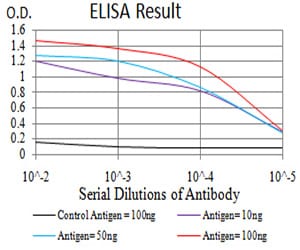

| WB | 咨询技术 | Human,Mouse,Rat |
| IF | 咨询技术 | Human,Mouse,Rat |
| IHC | 咨询技术 | Human,Mouse,Rat |
| ICC | 技术咨询 | Human,Mouse,Rat |
| FCM | 咨询技术 | Human,Mouse,Rat |
| Elisa | 1/10000 | Human,Mouse,Rat |
| Aliases | IBD10; WDR30; APG16L; ATG16A; ATG16L |
| Entrez GeneID | 55054 |
| clone | 8F8C2 |
| WB Predicted band size | 68.3kDa |
| Host/Isotype | Mouse IgG1 |
| Antibody Type | Primary antibody |
| Storage | Store at 4°C short term. Aliquot and store at -20°C long term. Avoid freeze/thaw cycles. |
| Species Reactivity | Human |
| Immunogen | Purified recombinant fragment of human ATG16L1 (AA: 11-257) expressed in E. Coli. |
| Formulation | Purified antibody in PBS with 0.05% sodium azide |
+ +
以下是关于ATG16L1抗体的3篇参考文献及其摘要内容:
---
1. **文献名称**: *ATG16L1 is required for autophagy in intestinal epithelial cells and protection of mice from Salmonella infection*
**作者**: Saitoh, T., et al.
**摘要**: 该研究利用ATG16L1抗体进行Western blot和免疫荧光分析,发现ATG16L1在小肠上皮细胞自噬中不可或缺。实验表明,ATG16L1缺失会损害细胞对沙门氏菌的清除能力,揭示了其在宿主防御中的关键作用。
2. **文献名称**: *A key role for autophagy and the autophagy gene Atg16l1 in mouse and human intestinal Paneth cells*
**作者**: Cadwell, K., et al.
**摘要**: 通过ATG16L1抗体检测蛋白表达,研究发现ATG16L1缺陷导致潘氏细胞异常,并增加小鼠肠道炎症易感性。该研究将ATG16L1基因突变与克罗恩病病理相关联,强调了自噬在肠黏膜屏障中的功能。
3. **文献名称**: *Genome-wide association study identifies novel susceptibility loci for Crohn’s disease and implicates autophagy in disease pathogenesis*
**作者**: Rioux, J.D., et al.
**摘要**: 此全基因组关联研究(GWAS)发现ATG16L1基因变异与克罗恩病显著相关。后续实验使用ATG16L1抗体验证了其在自噬体形成中的作用,提示自噬通路失调可能是疾病机制的核心。
---
这些文献均涉及ATG16L1在自噬及疾病中的功能研究,并通过抗体实验(如蛋白检测、定位分析)支持其结论。
ATG16L1 (Autophagy-related 16-like 1) is a critical protein in the autophagy pathway, a conserved cellular process responsible for degrading damaged organelles, proteins, and pathogens. It plays a central role in autophagosome formation, particularly in the LC3 lipidation step. Structurally, ATG16L1 interacts with the ATG5-ATG12 complex to form a larger complex essential for membrane elongation during autophagosome biogenesis. Research on ATG16L1 antibodies has gained momentum due to its association with human diseases, notably inflammatory bowel disease (IBD). A single-nucleotide polymorphism (T300A) in ATG16L1 is strongly linked to Crohn’s disease susceptibility, implicating defective autophagy in IBD pathogenesis.
ATG16L1 antibodies are widely used to study autophagy dynamics, protein localization, and expression levels in various models, including cell lines, tissues, and animal studies. These antibodies help detect full-length ATG16L1 (~70 kDa) and its isoforms, though cross-reactivity or post-translational modifications may require validation via knockout controls. Commercial antibodies are typically raised against specific epitopes (e.g., N-terminal or WD40 repeat domains) and validated for applications like Western blot, immunofluorescence, and immunohistochemistry. Challenges include distinguishing between cytosolic and membrane-bound forms or detecting disease-associated variants. Understanding ATG16L1’s role continues to shed light on autophagy-related mechanisms in immunity, cancer, and infection.
×